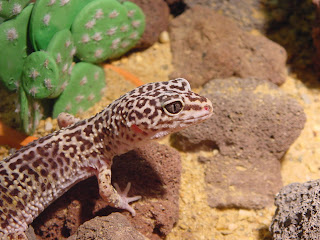True Wild Life | Gecko | There are thought to be over 2,000 different species of gecko found around the world and it is widely believed that there are more species of gecko that ate yet to be discovered. The gecko is a small to medium species of lizard that is found in the more temperate and tropical regions of the world. Geckos are more commonly found around the Equator and in the Southern Hemisphere although a few species of gecko are found north of the Equator in warmer regions. Geckos are found in a wide variety of colours and have various different markings on their bodies depending on the species of gecko.
Geckos are found in a wide variety of habitats in the warmer parts of the world including rocky deserts, mountains, jungles, rainforests, grasslands and even in urban areas where it is common to find geckos in houses. Geckos can range in size from just a few centimetre to more than 50 cm in length. The largest species of gecko is the Delcourt's gecko (which is now believed to be extinct), native to New Zealand and it grows to nearly 60 cm in length. The Jaragua Sphaero found in the Dominican Republic in South America, is the smallest species of gecko in the world and averages less than 2cm in length.
Geckos are well known for their amazing ability to walk up vertical surfaces even those as smooth as glass. The feet of the gecko are covered in tiny hairs that stick to surfaces like sucker pads. This adaptation means that the gecko is a very agile animal. Geckos are carnivorous reptiles so the diet of the gecko is based on meat from other animals. Geckos primarily eat insects and worms, but some of the larger species of gecko hunt small birds, reptiles and even small mammals such as mice. Some species of gecko are also known to eat a small amount of plant matter such as moss.
Due to their small size, geckos have a number of natural predators around the world, with the snake being the main predator of the gecko. Other animals that prey on the gecko include large spiders, birds and some mammal species.
After mating, the female gecko lays 2 sticky eggs, that have a soft shell and are white in colour. The gecko eggs quickly harden so that the developing gecko inside is more protected. The eggs of the gecko can take between 1 and 3 months to hatch but the incubation period is largely dependent on the species of gecko and the area in which it inhabit. The female gecko is not known to nurse or look after the baby geckos after they hatch.
Today, many species of gecko are considered to be threatened with extinction due to habitat loss and pollution. Geckos are also popular pets around the world and many are caught in the wild to be sold into the exotic pet trade.






Tidak ada komentar:
Posting Komentar